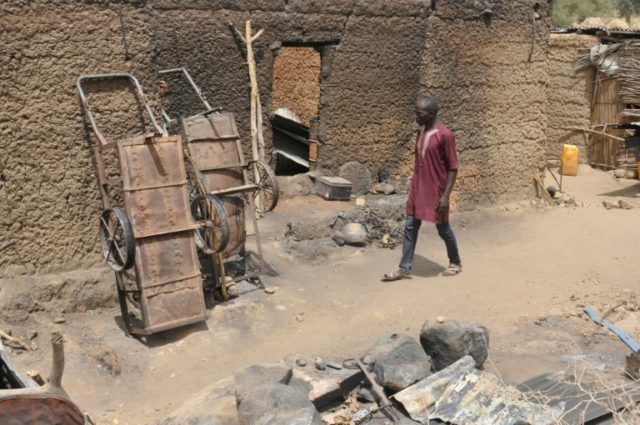Over 100 Boko Haram jihadis reduced an entire village to ashes in Cameroon near the country’s border with Nigeria, fatally setting at least 11 residents on fire while they slept, including children and elderly persons, and taking 100 people hostage after the attack late last week.
Echoing information from a member of a local self-defense militia, an anonymous source close to security services in the area told the Agence France-Presse (AFP) news agency on Friday, “Boko Haram made an incursion at night [on Thursday] in the Tchakamari [village] area. The toll is 11.”
The bodies were “charred,” the source added, noting that the jihadis had set fire to the entire village.
Voice of America (VOA), citing village resident Abba Malloum, placed the number of fatalities from the attack on the village at 13, adding that they “were shot to death or otherwise slaughtered, plus many wounded and about 100 men, women and children abducted.”
VOA learned that “over a hundred Boko Haram fighters attacked the village, shooting indiscriminately and setting fire to all the houses.”
Residents saw their maize, beans, groundnuts, and sheep engulfed in flames as the jihadis stole hundreds of their cattle.
VOA noted:
Tchakamari village, on Cameroon’s northern border with Nigeria, is deserted, with torched houses and animal carcasses bearing witness to the attack.
Resident Abba Malloum says the village of more than 400 people was reduced to ashes by Boko Haram fighters who came from neighboring Nigeria late Thursday night.
AFP learned from its local security sources that the attack began around 10 p.m on Thursday and carried on to 1 a.m. Friday, marking the deadliest Boko Haram raid into Cameroon in recent months.
The heinous assault prompted the U.S.-backed Multi-National Joint Task Force (MNJTF) of the Lake Chad Basin Commission to deploy troops to the village.
MNJTF includes forces from countries plagued by the Nigeria-based Boko Haram terrorist group including Nigeria itself as well as Cameroon, Chad, and Niger.
VOA reported:
Midjiyawa Bakary, governor of Cameroon’s Far North Region, has called for vigilance. He says after a crisis meeting of the Multinational Joint Task Force, troops have been deployed to secure the area and bring back the abducted people. The task force has been instructed to organize regular patrols and systematic searches of people, vehicles and homes and suspected villages and towns.
Boko Haram’s deadly insurgency, which began in Nigeria in 2009, has spilled over into neighboring Niger, Chad, and Cameroon, triggering a U.S.-assisted military response by the affected countries.
The jihadi group split into two factions in mid-2016, including the Islamic State (ISIS/ISIL) West Africa Province.
Although long-time Boko Haram leader Abubakar Shekau pledged allegiance to ISIS, the international terrorist group only recognizes and supports the West Africa branch. Both branches are terrorizing the West Africa region.
According to the Council on Foreign Relations (CFR), the Boko Haram conflict has left more than 36,000 people dead, including jihadis from the group (18,950), government forces (1,958), and civilians ( 15,953) combined.
Citing the United Nations, CFR noted that the conflict has also “displaced 2.4 million people and put more than seven million at risk of starvation.”
Even as victims continue to lament the killings and kidnappings linked to Boko Haram, the newly re-elected administration of President Muhammadu Buhari recently took credit for rendering Nigeria “totally free” of the jihadi group.
The Buhari administration has falsely claimed victory over Boko Haram on several occasions, prompting a member of the opposition to question the president’s mental state.
Nigeria’s Legit news outlet noted that the administration made those comments last week as Lt. Gen. Tukur Buratai, the chief of staff for the army, acknowledged that Nigerian troops had confined Boko Haram to the Lake Chad region and the Sambisa forest in northeastern Nigeria where they continue to terrorize residents.
U.S. and local officials have long considered the Sambisa forest, which covers parts of the northeastern Nigerian states of Borno, Yobe, Gombe, Bauchi, and Kano, to be Boko Haram’s last major stronghold in the country.
Borno State is the birthplace of Boko Haram.

COMMENTS
Please let us know if you're having issues with commenting.